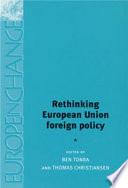
Rethinking European Union Foreign Policy
By - RET
Floor
-
Floor 1
Published
-
Manchester University Press, Manchester, 2004
ISBN 10 - 0719060028
ISBN 13 - 9780719060021
Book Status
-
1 Qnty Available with us.
Subject
-
European Union countries
Shelf No
-
15
Call Number
-
327.4 RET
Physical Description
-
175 pages ; 24 cm.
Notes
-
Includes indexes